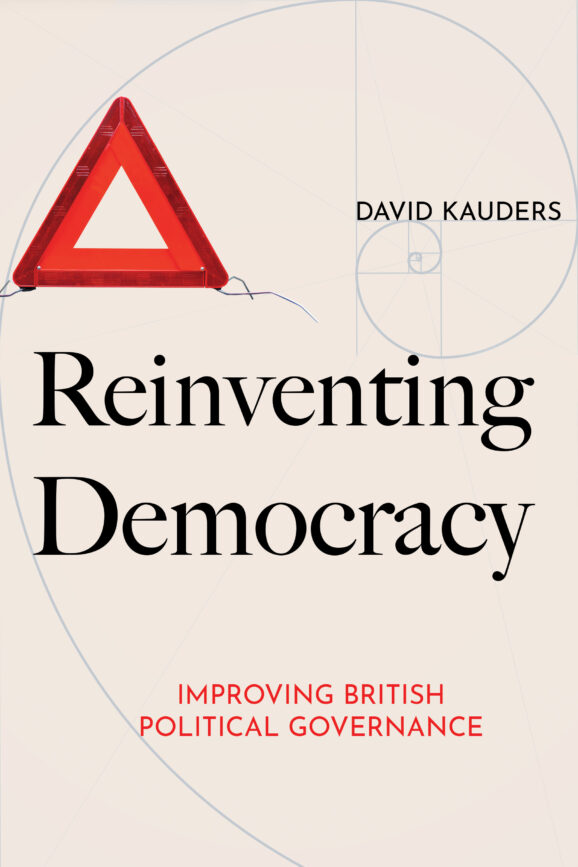Reinventing Democracy by David Kauders

John E. Kaye
- Published
- Authors, Home, Uncategorized

Reinventing Democracy by David Kauders provides a compelling and clear pathway out of Britain’s failing political morass towards a brighter, truly democratic future.
By Anne Caters
There is no doubt that the British Government, and politics in general, have faced very turbulent times over the past few years.
The EU Referendum and resulting Brexit, the Covid pandemic, wars in Europe and the Middle East, the privatisation of utilities, and the global cost of living crisis have cumulatively had an incredible impact on the country and its citizens.
Scandals and gross mismanagement now seem embedded in the political infrastructure, and as the UK’s economic fortunes continue to diminish on the world stage, social fragmentation and deprivation continue to escalate.
How much of this has hit those in charge, however, is debatable. Yes, prime ministers have fallen – even the Teflon-coated Boris Johnson – but to say they and their ministers have weathered the storm would be akin to saying the Normans just scraped by in the Battle of Hastings.
With their own financial portfolios and lucrative consultancy gigs to fall back upon, and a distinct lack of reputational consequences, they are insulated from the negative repercussions of their actions.
It is from this depressing backdrop that Reinventing Democracy: Improving British political governance by David Kauders emerges, tracing the UK’s malaise ultimately back to one thing: its political system.
The current two-party model is deeply flawed, says Kauders, being unfit for the needs and complexities of the modern world. It is, he believes, a system that encourages short-termism and self-serving opportunism irrespective of the party in power and one that, by giving absolute power to a select few, is inherently undemocratic.
Indeed, he compares it to something straight out of the 17th century, albeit with the absolute power of Government having replaced the divine right of kings, and with a firmly England-first agenda at the cost of Scotland, Wales, and Northern Ireland.
In such terms, a change of government will not solve the UK’s deep-set problems as it is merely replacing one powerful and privileged cabal with another.
What is clear is that change is urgently needed, and this is a sentiment shared by some 90 per cent of British electors, who according to recent research wish to see political reform.
But how can we make things better? Reinventing Democracy puts forward a compelling and detailed case for one model above all others: a federal United Kingdom.

Reinventing Democracy courageously tackles the gross failures of the British political system. Through concise and reasoned argument, Kauders asserts that the current system is at the root of economic and social decline, including rising poverty and collapsing public services.
According to Kauders, an investment manager who is credited with predicting the 2007-8 mortgage-related credit crunch, true democracy for the UK can only come by the replacement of its centralised government and power base with dispersed power throughout its constituent nations and regions.
By enabling economic and social self-governance, England’s dominance in the political management of the United Kingdom would cease. Under this system, the Houses of Parliament – ironically still viewed by many outsiders as a synonym with democracy – would be replaced with five parliaments: one for each of the four nations and one for those functions (such as defence) best provided jointly.
This federal parliament would, unlike within Westminster, give all individual home nations an equal say in policies and this would be supported by a fair voting system that mitigates the purely numerical dominance of English representatives.
Kauders refers to other working federal systems across the world, such as in Canada and Switzerland, his adopted home, and shows how their ability to manage a country efficiently, effectively, and transparently puts the UK’s track record to shame. He writes …
“Britain is highly centralised compared to the federal countries. Every British government department and agency has its own structure, local government spends central money according to central diktat, and face-to-face contact with anybody having decision-making authority requires lengthy journeys. No wonder citizens are alienated.”
By adopting a federal structure, British citizens would still enjoy unrestricted access throughout the UK while being a citizen of one of the home nations (which they would have the right to change).
Importantly, they would be given the keys to political governance in a way that has never happened before.
The current unelected, undemocratic, and autocratic House of Lords and Privy Council would be replaced by a largely elected, apolitical People’s Council, with all citizens having the right to put items on the political agenda.
The People’s Council would ensure that the people’s voice is heard and would approve all legislation, seeing an end to the government’s rubber stamping of legislation though Royal Assent.
As with all of the fundamental changes that he proposes to make the UK a federal country, Kauders sets out his proposed functions of the People’s Council in detail.
Likewise, he details the contents of a proposed written constitution – being the first such book to do so – which would formally codify and cement all citizens’ inalienable rights. Until now, the UK has prided itself on an unwritten constitution which, while flexible, is prone to erosion and erasure depending upon the whims of those in charge.
Together then, this represents a huge and unprecedented transfer of power. You could call it, in essence, a Magna Carta for the 21st century.
Gone would be the confusion inherent in trying to understand the tangle of legislation that has built up over the centuries. In its place, clarity, and with it, fairness.
That word, ‘fairness’, is what federalism seems to be about at its roots, and makes for very welcome reading to this humble citizen.
I feel that adoption of this new Constitution and a federal Britain, installed with careful consideration by the people, would be fairer, more transparent, and resistant to scandal and corruption, allowing the UK to be governed more effectively.
Of course, a federal system is for now just theoretical and it would no doubt need to be constructed over many years (Kauders envisages it taking up to 17 years from beginning to end).
However, the main purpose of Reinventing Democracy is to encourage thought-provoking debate on the virtues of replacing the current political system, and in this it succeeds admirably.
Writing in a dispassionate yet easy to understand way, Kauders’ notion that we are, at present, little more than serfs in a powerful state, beholden to politicians who serve themselves whilst claiming to represent all, is hard to disagree with.
Since reading his book, which benefits from the vantage point of a British expatriate in a European democracy, I have found myself aligning with his call for change.
It has, in short, been enlightening, inspiring, and eye-opening, and has led to many interesting discussions with my family and friends.
Kauders’ call for a bold revitalisation of democracy through a federal system – one that he argues with persuasion will truly empower the people – is timely and essential reading, making this book a valuable contribution to the discourse on political reform.
Reinventing Democracy: Improving British political governance by David Kauders (Sparkling Books) is available now for pre-order on Amazon in hardcover and eBook formats, and on Kobo in eBook format, priced £24.50 and 99p (UK only, rising to £4.99 after the 2024 General Election). The hardcover version will be available from all good bookstores and the eBook from all main eBook stores. David Kauders is also the author of The Greatest Crash: Avoiding the financial system limit , Understanding Brexit Options: What future for Britain? and The Financial System Limit: Britain’s real debt burden. For more information, visit www.sparklingbooks.com.
Q&A Interview With David Kauders
We speak to David Kauders, a respected investment manager and noted ‘radical thinker’, to learn more about his vision for reinventing democracy.

Q. Why does Britain urgently need a federal structure?
A. The system of political governance has failed. People have lost trust in politics, politicians and the government. The country is excessively centralised; nobody has time to govern properly or even to pass quality legislation. Scotland has a strong breakaway movement, which Wales is developing. Northern Ireland has the right to a border poll and may exercise that right within a decade. The elites impose their world view to suit exigencies of political competition in the first-past-the-post system, rather than listen to the people. Evidence? A hard Brexit that only a minority ever wanted.
Q. Why does it and its citizens need a written constitution?
A. A federal structure needs clearly defined responsibilities for the various parts, and accepted rules for amendments, that can only be provided through a written constitution. The present constitution is incomprehensible. It slowly concentrates power in the hands of the elite, by overturning changes that limit power while making those that strengthen power unchallengeable.
Q. How do you envision the distribution of powers in this proposed federal system?
A. The Federal government would be responsible for defence, foreign affairs, the currency, the sovereign grant, international agreements including those trade agreements requiring borders, common services, minimum standards for pensions, and all technical standards requiring consistency such as international financial requirements, roads, railways, air travel, and some infrastructure. Everything else is a matter for the sovereign nations. The draft constitution included in the book specifies proportional representation to the federal parliament and rules for federal referendums, but leaves those to national parliaments for national law as matters of their sovereignty.
Q. Why abolish the House of Lords instead of reforming it to be an elected assembly of the nations and regions, as proposed by Gordon Brown?
A. Gordon Brown’s proposals leave the Lords powerless. Its main purpose as a revising chamber is to quietly fix the government’s own legislative mistakes. It has no real power to oppose the Commons, which Brown does not wish to change. A powerless second chamber is useless, and voting for it would be a charade. The Brown proposal has no merit. My proposal for an elected People’s Council is democratic and gives the people real power over legislation and the policy agenda.
Q. What potential benefits do you believe a federal system could bring to the UK in terms of efficiency, as well as social and economic improvement?
A. Decisions would be taken at the right level. One-size-fits-all inevitably leads to inefficiency. The four nations could exploit their individual advantages. All the various boards, units, and regional offices of central control could be merged into the appropriate local government. Discontent and dividing lines would be replaced by cooperation for matters of mutual interest.
Q. Realistically, over what time frame would you see a federal system coming into effect?
A. The book sets out a timetable of up to seventeen years for the various democratic stages to go through, but this is from when parliament grasps the problem, since change has to come from within the present system.
Q. The replacement of the current political system would require Parliament to vote for it, which seems at present unlikely. What, then, do you hope to achieve through Reinventing Democracy?
A. Debate and recognition of the need for change has to start somewhere. People are concerned about immediate pressures: crumbling public services, the cost of living, the NHS, climate change. None will be fully resolved in the present system. The more people tell politicians that fundamental reform is needed, the more will politicians take note.
There are two scenarios covered in the book. One is a leader campaigning for change and being rewarded with a large majority. I do not see this happening in the forthcoming general election, though it is a possibility five years later, particularly if a new government fails to stem the decline. The other scenario is that the people deliver a hung parliament, with the balance of power held by smaller parties committed to change. I would be delighted if the Greens, True and Fair, SNP, and Plaid Cymru would take up the case for a federal structure. I would be even more delighted if the Liberal Democrats and Reform UK did the same. I would be amazed if the two large parties did so, since they seem to be more interested in acquiring absolute power.
Q. How do you think other countries would reframe their views of the UK if it moved to a federal structure?
A. I live in Switzerland and it is noticeable that people feel sad and sorry for Britain. More generally, Britain is seen as politically unstable and liable to make incoherent demands for special treatment. Those views can only improve if Britain faces up to its problems. The written constitution will be an essential component.
Q. How would you respond to those who may argue that a federal system could lead to increased bureaucracy and complexity?
A. Any change involves a period of adaptation. Once settled in, there should be neither more bureaucracy nor more complexity. Governments will need to learn the art of compromise. There are gains from bringing functions together, as discussed above.
Q. How could a federal system prevent scandal and corruption?
A. Scandals and corruption are rife when power is absolute. Dispersing power in a federal structure therefore reduces their incidence. The written constitution strengthens the checks and balances. My concept for a People’s Council includes the ability for the public voice to be heard. My draft constitution also includes a comprehensive ombudsperson service to hold all units of the state to account for individual failings.
RECENT ARTICLES
-
 Afore SURA awarded Pension Fund Management Company of the Year 2025
Afore SURA awarded Pension Fund Management Company of the Year 2025 -
 BOV Fund Services Limited wins in The European Banking & Finance Awards 2024
BOV Fund Services Limited wins in The European Banking & Finance Awards 2024 -
 Amberdata wins two titles in The European Banking & Finance Awards 2024
Amberdata wins two titles in The European Banking & Finance Awards 2024 -
 Ajman Bank wins in The European Banking & Finance Awards 2024
Ajman Bank wins in The European Banking & Finance Awards 2024 -
 Creditú wins three titles at The European Banking & Finance Awards 2024
Creditú wins three titles at The European Banking & Finance Awards 2024 -
 Krungthai Bank PCL wins five awards in The European Banking & Finance Awards 2024
Krungthai Bank PCL wins five awards in The European Banking & Finance Awards 2024 -
 Oakridge Property Group wins at The European Global Business Awards 2024
Oakridge Property Group wins at The European Global Business Awards 2024 -
 Old Mutual Investment Group wins two titles at The European Global Banking & Finance Awards 2024
Old Mutual Investment Group wins two titles at The European Global Banking & Finance Awards 2024 -
 AXA IM Select wins at The European Global Banking & Finance Awards 2024
AXA IM Select wins at The European Global Banking & Finance Awards 2024 -
 Zenith Bank Ghana wins five titles at The European Banking & Finance Awards 2024
Zenith Bank Ghana wins five titles at The European Banking & Finance Awards 2024 -
 SeABank awarded The Risk Management Bank of the Year - Vietnam 2024
SeABank awarded The Risk Management Bank of the Year - Vietnam 2024 -
 Vista Land & Lifescapes Inc. wins three titles at The European Global Business Awards 2024
Vista Land & Lifescapes Inc. wins three titles at The European Global Business Awards 2024 -
 Boursa Kuwait wins two titles at The European Global Sustainability & ESG Awards 2024
Boursa Kuwait wins two titles at The European Global Sustainability & ESG Awards 2024 -
 Gulf African Bank wins four titles at The European Banking & Finance Awards 2024
Gulf African Bank wins four titles at The European Banking & Finance Awards 2024 -
 Gulf Insurance Group awarded two Global Banking & Finance titles for 2024
Gulf Insurance Group awarded two Global Banking & Finance titles for 2024 -
 Eccelsa Aviation awarded three Global Business 2024 titles, including Best FBO Brand – Europe
Eccelsa Aviation awarded three Global Business 2024 titles, including Best FBO Brand – Europe -
 Afore Sura awarded Pension Fund Management Company of the Year 2024
Afore Sura awarded Pension Fund Management Company of the Year 2024 -
 Toledo Capital AG wins Best Boutique Wealth Management - Family Office 2024
Toledo Capital AG wins Best Boutique Wealth Management - Family Office 2024 -
 Banco de Chile awarded four Global Banking & Finance 2024 titles, including Bank of the Year - Chile
Banco de Chile awarded four Global Banking & Finance 2024 titles, including Bank of the Year - Chile -
 Kontora Family Office GmbH awarded Best Wealth Management Services - Germany 2024
Kontora Family Office GmbH awarded Best Wealth Management Services - Germany 2024 -
 Banque Misr awarded five Global Banking & Finance 2024 titles, including Best Banking Brand - MENA
Banque Misr awarded five Global Banking & Finance 2024 titles, including Best Banking Brand - MENA -
 Krungthai Bank PLC wins five awards in The European Banking & Finance Awards 2023
Krungthai Bank PLC wins five awards in The European Banking & Finance Awards 2023






















